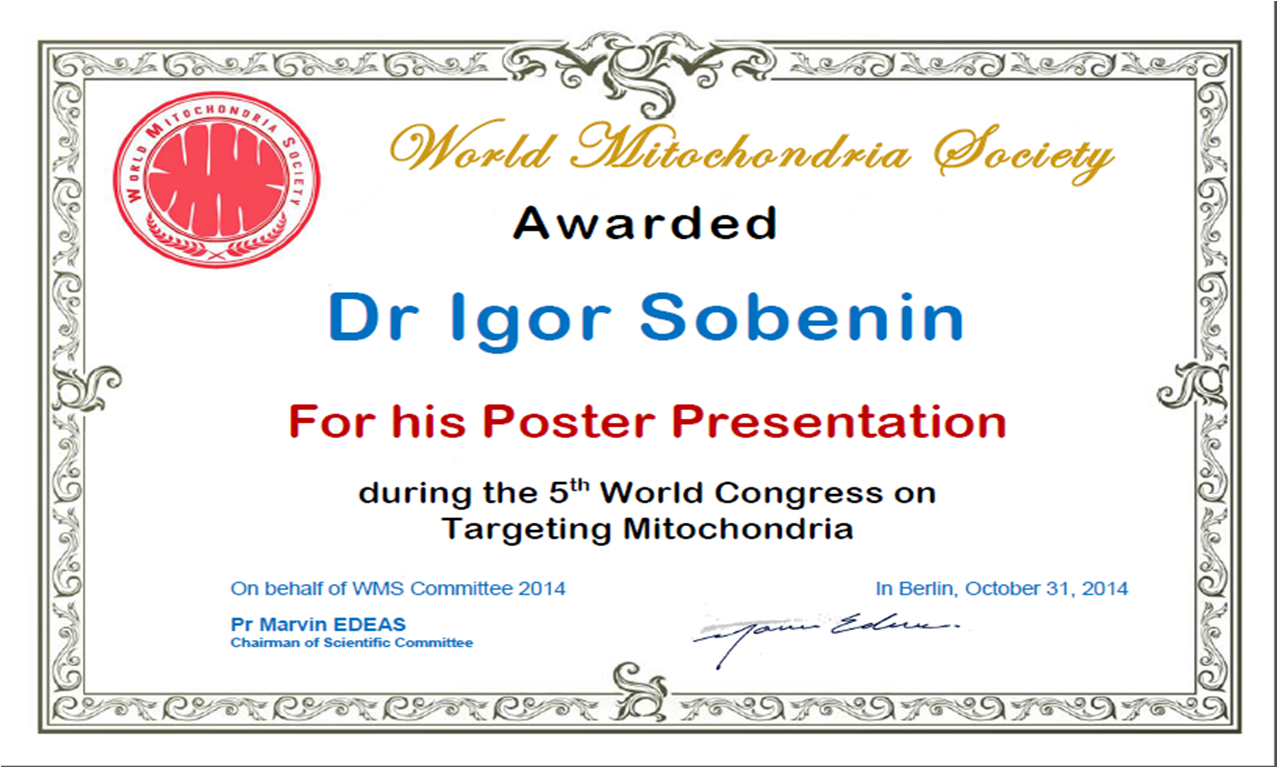WMS is pleased to award Dr. Igor Sobenin for his Poster Presentation

On behalf of the Scientific Committee, we congratulate Dr. Igor Sobenin from Russian Cardiology Research and Production Complex, Russian Federation for his award for Poster Presentation during Targeting Mitochondria World Congress which was held in Berlin, Germany.
Dr. Igor Sobenin has presented a Poster about "Association of Mitochondrial Mutations with Sublinical Carotid Atherosclerosis".
According Dr. Igor Sobenin: "In human pathology, several diseases are associated with somatic mutations in the mitochondrial genome (mtDNA). Even though mitochondrial dysfunction leads to increased oxidative stress, the role of mitochondrial mutations in atherosclerosis has not received much attention so far. Mitochondrial mutations may be one of the causes of atherosclerosis development in human arteries. Recently we have found that at least 10 mitochondrial mutations in 8 genes (rRNA 12S, 2 genes tRNA-Leu (codons recognized UUR and CUN), cytochrome B, and subunits 1, 2, 5, and 6 NADH dehydrogenase) had higher frequency in atherosclerotic plaques as compared to normal intima. The aim of present research was to reveal the association of the above mutations occurring in mitochondrial genome with the extent of subclinical carotid atherosclerosis. We have analyzed the association of mitochondrial genetic variation with the severity of carotid atherosclerosis, as assessed by carotid intima-media thickness (cIMT) and the presence of coronary heart disease (CHD) in 190 subjects from Moscow, Russia, a population with high CHD occurrence. cIMT was measured by high-resolution B-mode ultrasonography, and the level of mtDNA heteroplasmy in human leucocytes was determined by pyrosequencing method adopted for conditions where both mutant and normal allele were present in the same specimen. According to the results of ultrasonographic evaluation, the study participants were classified as non-atherosclerotic (NA), patients with diffuse intima-media thickening (DIT), and patients with subclinical atherosclerosis, who had at least one atherosclerotic plaque in common carotid artery (AP). The level of heteroplasmy was significantly higher for C3256T, G12315A and G15059A mutations in DIT and further in AP as compared to NA. On the opposite, the level of heteroplasmy declined from NA to AP for G13513A and Ins652G mutations. There was a strict linear-linear relationship between the extent of subclinical carotid atherosclerosis and quartiles of heteroplasmy for all above mutations (p<0.001). We found that heteroplasmies for several mutations in the mtDNA in leukocytes, including C3256T, T3336C, G12315A, G13513A, G14459A, G14846A, and G15059A mutations, were significantly (p<0.001) associated with both the severity of carotid atherosclerosis and the presence of CHD. These findings indicate that somatic mitochondrial mutations may play a significant role in the development of atherosclerosis, and demonstrate the evidence for genetic predisposition to atherosclerosis on the level of mitochondrial genome."
For more information about Targeting Mitochondria 2014: www.targeting-mitochondria.com


